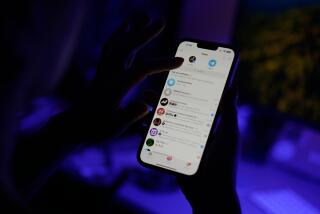Jury Hears of Angry Letter by McVeigh
- Share via
DENVER — Just two months before the Oklahoma City bombing, Timothy J. McVeigh wrote a searing, rambling, often incoherent letter in which he described himself as a “desert rat” prepared to rip the heads off his enemies.
The February 1995, letter, introduced as evidence Thursday in McVeigh’s trial, evokes the thinking of a highly disturbed young man comparing himself to America’s founding fathers one moment and to a member of the violent underground militias and hate groups of today in the next.
“My whole mind-set has shifted from intellectual to animal,” McVeigh wrote to a friend in Michigan. “Rip the bastards’ heads off and [expletive] down their necks! And I’ll show you how with a simple pocketknife.”
McVeigh also wrote that he did not expect to live more than two more years, that he was afraid his body would begin to deteriorate and that he would much rather “burn out” soon than rot away in a nursing home.
“Hell,” he wrote, “you only live once and I KNOW you know it’s better to burn out than . . . rot away in some nursing home. My philosophy is the same--in only a short 1-2 years, my body will slowly start giving away. First maybe knee pains, or back pains, or whatever, but I won’t be ‘peaked’ anymore.
“Might as well do some good as long I can be 100% effective.”
On April 19 of that year, the Alfred P. Murrah Federal Building was destroyed in Oklahoma City. The explosion killed 168 people. An additional 500 were injured. And McVeigh was arrested and charged in the worst terrorist attack in U.S. history.
The letter was read to the jury during testimony by Kevin Nicholas, a 33-year-old friend of McVeigh in Michigan. He said that McVeigh wrote it to Gwenn Strider, Nicholas’ wife’s aunt, and that she later gave it to Nicholas.
In the letter, McVeigh boasted that he had been “passing out” anti-government literature “before anyone had ever heard the words ‘patriot’ or ‘militia.’ ”
He discussed the 1992 FBI siege at Ruby Ridge, Idaho, in which separatist Randy Weaver’s wife, Vicki, was killed. “The FBI sniper blew Vicki Weaver’s head off,” McVeigh wrote. “What goes around comes around.”
McVeigh described a “list” of about 300,000 people kept by a “supercomputer in Brussels, Belgium,” that the U.S. government considers “possible and suspected subversives and terrorists.”
He quoted Abraham Lincoln, saying the 16th president said that “to sin by silence when they should protest makes cowards of men.” And he said that, if the country’s founding fathers “had been scared of a ‘list,’ we’d still be under the tyrannical rule of the crown.”
He ended the letter with “Seeya, The Desert Rat.”
Nicholas also testified about an incident in December 1994, when McVeigh called him from a truck stop in Michigan saying that he had been in an accident and needed help. Nicholas went to the scene and helped move several bulky items from McVeigh’s car into his truck, including several wrapped in Christmas paper.
Later, he said, McVeigh told him what was inside the Christmas wrapping.
“He said caps,” Nicholas testified. “He said blasting caps. He said he got them dirt cheap.”
Earlier in the trial, Lori Fortier, another friend of McVeigh, testified that she had helped him wrap blasting caps after he had indicated to her that they had been stolen. The government has suggested that the caps were used in the bombing of the Murrah building.
Nicholas further testified that McVeigh was bitter about a gun collector in Arkansas for whom he had worked. “He said [that the collector] had screwed him out of some money,” Nicholas said. “He said he’d be an easy guy to rob because he lived way back in the sticks and there were woods around his house.”
Prosecutors have maintained that the man was robbed and that the proceeds were used to further the bombing conspiracy.
Also taking the witness stand Thursday was Eric McGown, 19, who worked with his mother at the Dreamland Motel in Junction City, Kan. McVeigh stayed there in the days before the bombing, including Monday, April 17, the day he allegedly rented the Ryder rental truck used in the blast.
But McGown, under intense cross-examination by McVeigh attorney Stephen Jones, said that he thought he may have seen McVeigh with the truck on Sunday, April 16, which would be impossible under the government’s theory that McVeigh rented the truck a day later.
McGown’s testimony was confusing, and the youth appeared nervous and somewhat distraught. At one point, he said: “I thought it was Sunday. It might have been Monday. I’m just not sure.”
The trial continues today.
More to Read
Sign up for Essential California
The most important California stories and recommendations in your inbox every morning.
You may occasionally receive promotional content from the Los Angeles Times.











